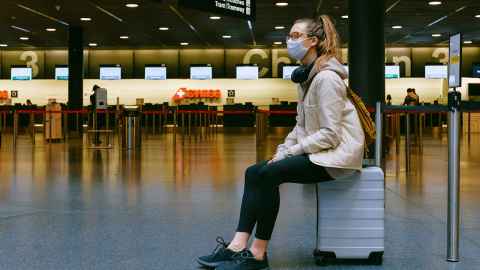Why the numbers of Covid cases don't speak for themselves
31 August 2020
Opinion: Paediatrician and PhD candidate Dr Jin Russell explains why understanding the risks of Covid-19 in New Zealand requires local knowledge of our population and healthcare system.

New Zealand's first lockdown was so effective in eliminating coronavirus that imagining the full impact of Covid-19 to New Zealand is an abstract exercise, drawing on patchy reporting of deaths and disruption overseas.
According to Johns Hopkins University, there have been more than 800,000 deaths globally because of Covid-19 from more than 24 million cases. These are almost certainly under-estimates because of a lack of testing. Meanwhile, at the time of writing, New Zealand has recorded 22 deaths from Covid-19.
It is tempting to look at the almost 1,700 cases* in New Zealand and wonder whether the virus is very dangerous after all.
*Numbers are accurate at the time of writing.
A recent opinion piece published in the New Zealand Herald by commentator Matthew Hooton drew attention to New Zealand Ministry of Health data of Covid-19.
Data on cases and deaths, broken down by age group, was cited to downplay the risks of Covid-19 to New Zealanders.
Not a single person under the age of 60 years has died of Covid-19, despite more than 1600 cases, Hooton reported.
Covid-19 is only truly dangerous for those over 80 years of age, he concluded, with a "30 percent chance of being hospitalised or dying".
This is where Hooton, and many others, make dangerous errors in their thinking.
Greater age is not the only risk factor for dying from Covid-19, and dying from Covid-19 is not the only health outcome we are interested in.
In a scientific paper published in Nature in July, Dr Elizabeth Williamson and colleagues found that co-morbidities such as diabetes, chronic lung disease and severe asthma, obesity and cancer, were each associated with an increased risk of death from Covid-19.
An estimated 200,000 New Zealanders have diabetes. The prevalence of diabetes among Māori and Pacific peoples is three times higher than New Zealand Europeans, and high among South Asian people.
New Zealand has one of the highest rates of asthma in the world. More than 600,000 people take medication for asthma. Respiratory hospitalisations are two times higher for Pacific and Māori peoples.
New Zealand has the third highest adult obesity rate in the OECD with one in three adults obese, and one in ten children. Once again, obesity disproportionately affects deprived, Māori and Pacific communities.
Each year, around 23,000 New Zealanders are diagnosed with cancer.
The Nature paper found that greater deprivation, and those of "black" and "South Asian" ethnicity, were at increased risk of death from Covid-19.
Why is this important? It is important to understand that New Zealand has a high burden of comorbidities that would make New Zealanders more likely to die or do poorly compared to other countries, and that Covid-19 would disproportionately affect our Māori, Pacific, South Asian and poor communities. Our collective response is also a matter of justice, protecting those among us who are most vulnerable.
The majority of the 1500 cases in the first wave were among European New Zealanders – travellers returning from overseas and their households.
Māori and Pacific peoples comprised only 14 percent of first-wave cases.
In epidemiological terms, we would refer to this as a "biased sample" - the subgroups who are most at risk of death were under-represented. We can't accurately predict how Covid-19 would impact our population from the Ministry of Health data we have, we need to be cleverer than this.
A paper published in Nature Medicine by Aakriti Gupta and colleagues described non-pulmonary complications from Covid-19. Aside from damage to the lungs, how does Covid-19 harm people? Among those hospitalised or seriously unwell, 30 per cent had acute cardiac muscle injury, up to 30 per cent acute kidney injury, 6 per cent stroke, up to 52 per cent signs of liver injury, 8-9 per cent had confusion or impaired consciousness. It's clear that Covid-19 is much more dangerous than seasonal flu.
There is increasing evidence of a post-Covid syndrome as well – known as "long-haul Covid". Previously fit and well people describe chronic breathlessness and fatigue. In a German follow-up study published in JAMA Cardiology, 60 percent of people who had recovered from Covid-19 had ongoing heart muscle inflammation two months later.
Finally, we must consider a very important factor – our healthcare capacity. In March, before lockdown, New Zealand had a total of 153 Intensive Care Unit beds. That number has increased since to at least 358, possibly higher, but there is not an infinite supply.
These beds are not laying idle, they are already filled with patients recovering from surgery, severe illnesses, and trauma. An intensive care bed is not merely a bed and a ventilator, but an ecosystem of highly trained medical staff, providing 24/7 care.
Our healthcare workforce is committed, capable, but thin. PPE stocks are in short supply internationally. There is not a lot of slack in the system.
Making predictions about people's health using data is the domain of epidemiology.
Numbers do not speak from themselves, and novice attempts at interpretation can lead to dangerous miscalculations.
Understanding the risks of Covid-19 to New Zealanders requires local knowledge of our health inequities, burden of disease, and healthcare system limits. Taking a wider view helps us see why New Zealand must take an aggressive stance on Covid-19.
Dr Jin Russell is a developmental paediatrician and PhD candidate in life course epidemiology in the Faculty of Medical and Health Sciences.
This article reflects the opinion of the author and not necessarily the views of the University of Auckland.
Used with permission New Zealand Herald, 'Jin Russell: Why the numbers of Covid cases don't speak for themselves', 28 August 2020.
Media contact
Paul Panckhurst | Media Adviser
Mobile: 022 032 8475
Email: paul.panckhurst@auckland.ac.nz